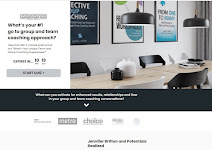Welcome back to our tenth of our eighteen Group Coaching Core Essentials. This week’s focus is on the principle of “ Maximum learning requires individuals to participate actively in an experience.”
Coaching is an active learning experience SHAPED by the clients we work with.
Co-Creation is at the heart of a group or peer coaching process and coaches will practically want to build in time and space for debriefing or discussion.
In group coaching, you will want to spend time early on in the process to identify and shape your roadmap as a group.
Unlike training which is content-rich and all about the passage of information, group coaching is primarily about discovery and dialogue. Any training/content elements are best kept separate, either as pre-work or post work to enable the time together to be focused on dialogue. It is in this space of dialogue that we want to FORWARD ACTION and DEEPEN AWARENESS.
Understanding and integrating experiential education principles allows participants to discover knowledge for themselves.
As I have shared before, experiential processes are based on the models of David Kolb and his four-stage process often referred to as the ERGA. ERGA stands for Experience, Reflection, Generalization and Application. Experiential processes are also defined as “learning by reflecting on doing”.
In experiential processes (which could find us coaching, facilitating or training) we support learning, and conversations around:
Experience – What the person/group member is experiencing int heir world. In other words: WHAT?
Reflection – Creating a pause for reflection on what is going on? What really happened? This is known as the SO What?
Generalization – Based on what you have learned or experienced, what can you apply to other contexts?
Application – What might you be able to apply?
Check out this great video from the Experiential Learning Institute (4 min) on Experiential Education:
As you consider this best practice, practically you will want to:
- Consider what "ACTIVE EXPERIENCES" mean? Does this mean creating things in the moment (i.e. like a hands-on design weekend where people build out a business plan? Does ACTIVE mean incorporating kinesthetic, somatic or body-centered approaches?
- Consider what pauses you provide for people to look at, and reflect on their everyday experiences.
- Consider what pauses you provide for people to explore WHAT ELSE is possible as you move forward.
- Experiential processes can take a number of forms in a coaching conversations including:
- Paired work, or triad work, around what experiences people are having
- Create the space for reflective pauses like Journaling Prompts like our Square Journaling Cards which are available as a digital product you can incorporate into your own work
What are you doing to create the space for group coaching members to bring in their own experiences, reflect on them and consider what they want to apply going forward?
Enjoy the conversation,
Jennifer
Want to know what's new? Looking for remote and hybrid resources - Pick up a copy of the Reconnecting Workspaces book or the 90-Day Guide for Success. Instagram: @ReconnectingWorkspaces
Upcoming Programming this fall includes:
Group Coaching Essentials (8.75
CCEs) - Join us in September on Fridays from 1015 - 1130 am ET starting September 9th for 5 weeks
Team Coaching Essentials (14
CCEs) - next starts on Monday September 12th for 6 weeks - With Kathy Vaughan
and Jennifer
Advanced Group and Team Coaching Practicum (10 CCEs): Starting Fridays at 1230 pm ET on September 9th for 6 weeks (With Jennifer)
Mentor Coaching Group - for ACC/PCC - Fridays 9-10 am ET running from September 9 - December 9th (with Jennifer)
Supervision Group for Team Coaches
- 10 hours - Thursdays starting September 15th and running to March
(with Jennifer and Kathy - meets ICF and EMCC supervision requirements
for team coaches)
Jennifer is also the author of Effective Group Coaching (2010), Coaching Business Builder (2018), Effective Virtual Conversations (2017) and From One to Many: Best Practices for Team and Group Coaching (2013). Check out her author page on Amazon for all publications.
.png)










No comments:
Post a Comment